Related Research Articles
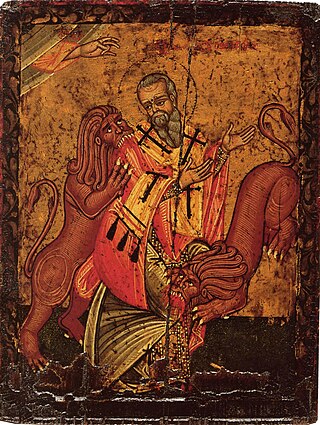
The word catholic comes from the Greek phrase καθόλου 'on the whole, according to the whole, in general', and is a combination of the Greek words κατά 'about' and ὅλος 'whole'. The first known use of "Catholic" was by the church father Saint Ignatius of Antioch in his Letter to the Smyrnaeans. In the context of Christian ecclesiology, it has a rich history and several usages.
Dogma, in its broadest sense, is any belief held unquestioningly and with undefended certainty. It may be in the form of an official system of principles or doctrines of a religion, such as Judaism, Roman Catholicism, Protestantism, or Islam, as well as the positions of a philosopher or of a philosophical school, such as Stoicism.
Orthodoxy is adherence to correct or accepted creeds, especially in religion.

Exsurge Domine is a papal bull promulgated on 15 June 1520 by Pope Leo X. It was written in response to the teachings of Martin Luther which opposed the views of the Catholic Church. The bull censured forty-one propositions abstracted from Luther's writings, and threatened him with excommunication unless he recanted within a sixty-day period commencing upon the publication of the bull in Saxony and its neighboring regions.
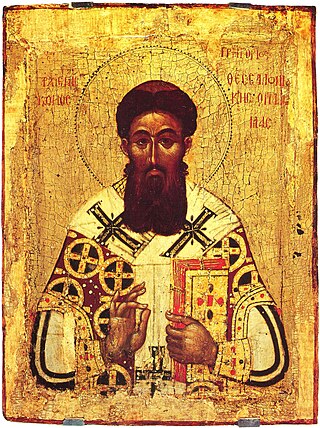
In Eastern Orthodox (palamite) theology, there is a distinction between the essence (ousia) and the energies (energeia) of God. It was formulated by Gregory Palamas (1296–1359) as part of his defense of the Athonite monastic practice of Hesychasm against the charge of heresy brought by the humanist scholar and theologian Barlaam of Calabria.
Humani generis is a papal encyclical that Pope Pius XII promulgated on 12 August 1950 "concerning some false opinions threatening to undermine the foundations of Catholic Doctrine". It primarily discussed, the encyclical says, "new opinions" which may "originate from a reprehensible desire of novelty" and their consequences on the Church.
In Christian theology, baptism of desire, also called baptism by desire, is a doctrine according to which a person is able to attain the grace of justification through faith, perfect contrition and the desire for baptism, without the water baptism having been received.
Dogmatic theology, also called dogmatics, is the part of theology dealing with the theoretical truths of faith concerning God and God's works, especially the official theology recognized by an organized Church body, such as the Roman Catholic Church, Dutch Reformed Church, etc. At times, apologetics or fundamental theology is called "general dogmatic theology", dogmatic theology proper being distinguished from it as "special dogmatic theology". In present-day use, however, apologetics is no longer treated as part of dogmatic theology but has attained the rank of an independent science, being generally regarded as the introduction to and foundation of dogmatic theology.
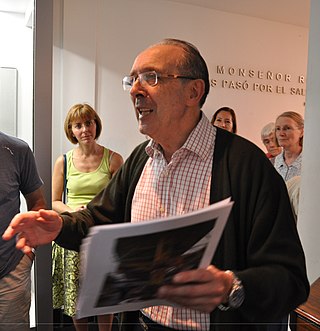
Jon Sobrino is a Spanish Jesuit Catholic priest and theologian, known mostly for his contributions to Latin American liberation theology. He received worldwide attention in 2007 when the Vatican's Congregation for the Doctrine of the Faith issued a notification for what they termed doctrines that are "erroneous or dangerous and may cause harm to the faithful."
Heresy in Christianity denotes the formal denial or doubt of a core doctrine of the Christian faith as defined by one or more of the Christian churches.
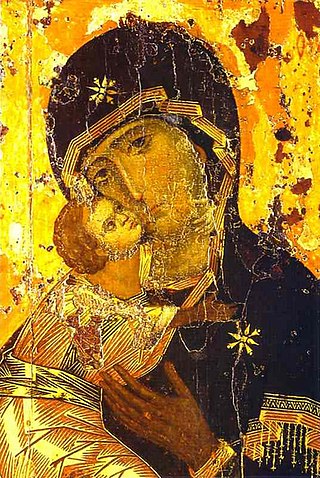
Mariology is the theological study of Mary, the mother of Jesus. Mariology seeks to relate doctrine or dogma about Mary to other doctrines of the faith, such as those concerning Jesus and notions about redemption, intercession and grace. Christian Mariology aims to place the role of the historic Mary in the context of scripture, tradition and the teachings of the Church on Mary. In terms of social history, Mariology may be broadly defined as the study of devotion to and thinking about Mary throughout the history of Christianity.

A dogma of the Catholic Church is defined as "a truth revealed by God, which the magisterium of the Church declared as binding". The Catechism of the Catholic Church states:
The Church's Magisterium asserts that it exercises the authority it holds from Christ to the fullest extent when it defines dogmas, that is, when it proposes, in a form obliging Catholics to an irrevocable adherence of faith, truths contained in divine Revelation or also when it proposes, in a definitive way, truths having a necessary connection with these.
The term dogmatic fact is employed in the teaching of the Catholic Church, to mean any fact connected with a dogma, wherein the application of the dogma is itself what constitutes, or more accurately canonizes, the fact.
The theological notes designate a classification of certainty of beliefs in Catholic theology.

Heresy is any belief or theory that is strongly at variance with established beliefs or customs, particularly the accepted beliefs or religious law of a religious organization. A heretic is a proponent of heresy.
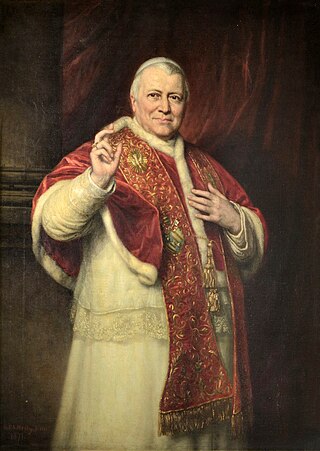
Papal infallibility is a dogma of the Catholic Church which states that, in virtue of the promise of Jesus to Peter, the Pope when he speaks ex cathedra is preserved from the possibility of error on doctrine "initially given to the apostolic Church and handed down in Scripture and tradition". It does not mean that the pope cannot sin or otherwise err in some capacity, though he is prevented by the assistance of the Holy Spirit from issuing heretical teaching even in his non-infallible Magisterium, as a corollary of indefectibility. This doctrine, defined dogmatically at the First Vatican Council of 1869–1870 in the document Pastor aeternus, is claimed to have existed in medieval theology and to have been the majority opinion at the time of the Counter-Reformation.
The position of the Eastern Orthodox Church regarding the Filioque controversy is defined by their interpretation of the Bible, and the teachings of the Church Fathers, creeds and definitions of the seven Ecumenical Councils, as well as the decisions of several particular councils of the Eastern Orthodox Church.
Heresy is defined by the Catholic Church as "the obstinate denial or obstinate doubt after the reception of baptism of some truth which is to be believed by divine and Catholic faith". The term heresy connotes both the belief in itself, and the attitude towards said belief.
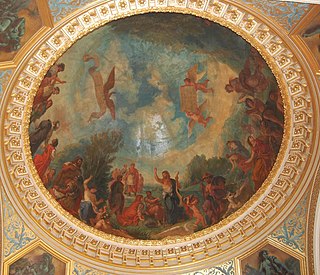
A theologoumenon is a theological statement or concept that lacks absolute doctrinal authority. It is commonly defined as "a theological assertion or statement not derived from divine revelation", or "a theological statement or concept in the area of individual opinion rather than of authoritative doctrine".
References
- 1 2 Hardon, John A. (1980). "THEOLOGICAL CENSURE.". Modern Catholic Dictionary. Internet Archive. Garden City, N.Y.: Doubleday. p. 537. ISBN 978-0-385-12162-0.
- 1 2 "CATHOLIC ENCYCLOPEDIA: Theological Censures". www.newadvent.org. Retrieved 2023-02-04.
- ↑ Ott, Ludwig (n.d.) [195X]. "INTRODUCTION — §9. Theological Censures". In Bastible, James (ed.). Fundamentals of Catholic Dogma. Translated by Lynch, Patrick. Fort Collins, Colorado: Roman Catholic Books. p. 10. ISBN 978-1-929291-85-4.
By a theological censure is meant the judgment which characterises a proposition touching Catholic Faith or Moral Teaching as contrary to Faith or at least as doubtful.
- ↑ Ernst, Harold (December 1, 2002). "The Theological Notes and the Interpretation of Doctrine" (PDF). Theological Studies. 63 (4): 813–825. doi:10.1177/004056390206300407.
- ↑ Finisterhölzl, Johann (1975). "Theological notes". In Rahner, Karl (ed.). Encyclopedia of Theology: The Concise Sacramentum Mundi. Seabury Press. p. 1678. ISBN 978-0-86012-006-3.
- ↑ Finisterhölzl, Johann (1975). "Theological notes". In Rahner, Karl (ed.). Encyclopedia of Theology: The Concise Sacramentum Mundi. Seabury Press. p. 1681. ISBN 978-0-86012-006-3.
- ↑ Pierre Fraenkel (1961). "Chapter VIII: Quasi Censoriae Notae – The Terms of Censure". Testimonia Patrum: The Function of the Patristic Argument in the Theology of Philip Melanchthon. E. Droz. p. 308.
- ↑ Finisterhölzl, Johann (1975). "Theological notes". In Rahner, Karl (ed.). Encyclopedia of Theology: The Concise Sacramentum Mundi. Seabury Press. p. 1682. ISBN 978-0-86012-006-3.
- 1 2 Ott, Ludwig (n.d.) [195X]. "INTRODUCTION — §9. Theological Censures". In Bastible, James (ed.). Fundamentals of Catholic Dogma. Translated by Lynch, Patrick. Fort Collins, Colorado: Roman Catholic Books. p. 10. ISBN 978-1-929291-85-4.
- ↑ "Heresy". Catholic Encyclopedia. New Advent. 1912. Retrieved 6 March 2017.
 This article incorporates text from this source, which is in the public domain .
This article incorporates text from this source, which is in the public domain . - ↑ une Equipe de Théologiens Catholiques (1969). "Notes théologiques". In Panneton, Georges; Charlemagne, Bourgeois (eds.). Sommaire de théologie dogmatique[Summary of Dogmatic Theology] (in French). 21 July 1969 recommendation letter by Alfredo Ottaviani. Trois-Rivières: Les Éditions du Bien Public. pp. 19–20. OCLC 301544953.